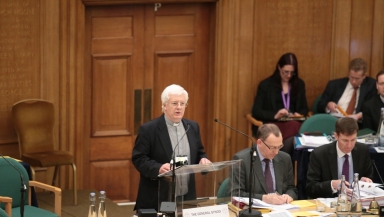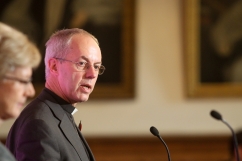
The Church of England is to change its laws to allow people who commit suicide, whatever the circumstances, to be buried or cremated according to its funeral rites.
Currently, Church of England clergy are not allowed to conduct the funeral of a person who takes their own life while deemed to be "of sound mind".
Canon Michael Parsons of the Gloucester diocese told the General Synod meeting in Church House, Westminster: "This is widely disregarded by most clergy and even more widely unknown."
He said there was a history of suicide burials being outside churchyards, at night, and even with a stake through the body as a warning to others. Until 1882, suicides by law had to be buried between 9pm and midnight.
Such attitudes had led to the view, he admitted, that the Church was "hostile" to suicide.
"I was told a few months ago of an elderly parishioner of mine who only 60 years ago was refused a church service for her husband – and has never been near the church since."
Synod heard it was young men, who often appeared cheerful and successful, who were most vulnerable.
Suicide ceased to be a crime in Brtain 1961 and the forfeiture of property disappeared in the 19th century but the Church of England still insists on an "archaic" sound mind clause, the synod was told.
In 1983 the Vatican repealed its own canon law barring suicides from church funerals or burials, although attempted suicide can still be a bar to ordination.
Canon Parsons said suicide was often a failure of hope, but also a choice of the least painful option, to die rather than to live. "The pastoral difficulty for those dissenting from the majority viewpoint is that while they do not want to condemn in any way those who take their own lives, nor do they want to be seen to encourage it," he said. "Suicide is almost always a disaster for the friends and family left behind, we can and do ease some of the pain by sensitive funeral ministry."
Rev Paul Hutchinson, of York, said thousands of clergy and lay ministers had conducted funerals of people who had taken their own lives.
Rev Jonathan Frais of Chichester said his first ever funeral visit involved a suicide and he now lived on the coast a few miles from Beachy Head, where a chaplaincy team is dedicated to trying to change the minds of people heading there to commit suicide.
The Bishop of Exeter, Rt Rev Robert Atwell, giving his maiden speech, said few in synod had not been "devasted" by a suicide. It was always a tragedy. The Church of England's current canon law was not suitable and the authorised resources "inadequate and poor".
He said: "Increasingly today there is a certain amount of apprehension when they approach the church regarding funeral and particularly when there is a suicide." There was fear of being judged. "We need to have our pastoral antennae really alert, really sensitive."
Baptist Union of Great Britain representative Rev Dr Paul Fiddes, whose 19-year-old son took his own life, said that in the Nonconformist churches, the forms of services to be used in funerals of suicides were up to the local minister, unhampered by acts of parliament.
Such ministers might be affected by theology, though, especially if the minister believed that the dead person had by committing suicide cut himself off from the "elect".
Dr Fiddes urged generosity in assessing pastoral need. Enquiring if someone who had committed suicide life was of sound or unsound mind was not an attitude of "acceptance", he said. "I experienced an acceptance without limits. In other people's case, such acceptance might well require a change in Church law."
The Archbishop of York Dr John Sentamu said it was not correct that a Church of England clergy could not conduct the funeral of a person who had committed suicide. The law merely said a bishop had to approve the service to be used. "Synod should be clear that funeral services are provided by the Church of England for those who commit suicide," he insisted. However, synod also heard that there was no known funeral service for a suicide that had been approved by a bishop.
Clergy in any case generally ignore the Church's law, the synod heard, and use authorised funeral liturgies to bury suicides, whether of "sound" or "unsound" mind, just as they did to bury people who had never been baptised.
Prudence Dailey of Oxford was one of the few to speak against the motion. She said: "No-one, whatever that person has done, can be beyond the mercy and love of God. That is certainly not a judgement that either the synod or a person taking funerals can be expected to make on God's behalf."
She said it could be safely assumed that anyone suffering so much they had taken their own life was quite likely to have been of unsound mind. "It is nevertheless the teaching of the Church that we have inherited that suicide is wrong. I am worried about the message we might send out if we accept this amendment."
She added: "At present it is quite clear that those who die of their own hand while of unsound mind can receive a Christian burial." She was worried that by changing its law on the issue, the Church might be seen as endorsing assisted suicide.
Bishop of Sodor and Man Robert Paterson, vice-chair of the liturgical commission, said rules that could not be enforced should be repealed or not enacted in the first place. "Any parish priest with a heart and a brain learns very quickly that there are no slick answers to the enigma of suicide. Every suicide I encountered and every bereaved family I encountered in nearly three decades as a parish priest opened up questions that could not be answered." He said it was a "moral swamp". Stating that the law urgently needed amending, he added: "If we really believe that Samson did not commit suicide but died in battle, what on earth do we make of suicide bombers?"
















